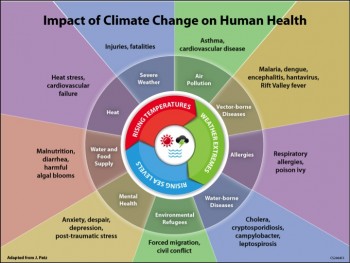 by Dr Anthony Horton, The AIM Network: http://theaimn.com/spotlight-on-health-and-climate-change-long-overdue/
by Dr Anthony Horton, The AIM Network: http://theaimn.com/spotlight-on-health-and-climate-change-long-overdue/According to Damian Ryan, Head of International Policy at The Climate Group there is no better time to apply a spotlight to health and climate change.
Higher temperatures will either create a range of illnesses, disease or injuries or exacerbate them, at a time when ageing populations and lifestyle diseases such as diabetes and heart disease will place increasing strain on health systems around the world.
Heat waves are likely to have health impacts for significant numbers of people around the world, as evidenced by events in Western Europe in 2003 and Russia in 2009 when 80,000 and 50,000 premature deaths respectively were reported. Vulnerable poor and elderly people made up the majority of these counts.
Vector-borne diseases normally contained within temperature thresholds that contain their habitats are also likely to spread with higher temperatures. There is now evidence that malaria which is spread by the Anopheles mosquito is now present in regions that were previously regarded as too cool for the mosquito’s survival, such as the Ethiopian highlands.
Cases of the West Nile virus, a potentially fatal mosquito-borne disease are likely to spread to the United States as a result of climate change. Lyme disease which is transmitted by ticks is also expected to spread with increasing temperatures, and the USEPA added it to its list of climate change indicators last year.
Water supplies and sewage systems are also vulnerable to climate change due to more destructive and frequent floods and hurricanes, and damage to either or both could increase the likelihood of water and food borne diseases, particularly in poorer communities that have lower resilience and adaptive capacity.
Water supplies in Bangladesh are already being impacted due to rising sea levels as a result of climate change. Professor Paolo Venesis from Imperial College in London has noted that the intrusion of salty water into the drinking water supply can lead to increases in the number of hypertension cases and other associated negative health impacts. In Bangladesh, hundreds of thousands of people are exposed to this risk.
It is important at this point to recognise that the climate is already interacting with a range of pollutants with dramatic results. In northern China, a joint United States-Chinese study found that air pollution from coal burning has reduced the average life expectancy by 5.5 years.
Anyone would say that this is clearly unacceptable, however we need to realise that rich and poor countries are still struggling to manage nitrous oxides (from a range of sources), ozone (formed in a reaction under specific circumstances) and particles from coal burning.
The US Clean Air Act has reduced air pollution significantly, however a Harvard Study estimated that the annual cost of coal use in the US was $345-$500 billion in negative health effects. This range was far beyond the economic cost of coal as an energy source.
In a number of poorer countries, the use of inefficient poorly ventilated kerosene and biomass stoves for cooking is a significant contributor to the 7 million deaths worldwide that is attributed to air pollution by the World Health Organisation, with heart and lung disease being the most significant killers.
The evidence of the major health and environmental benefits of tackling climate change continues to mount, and as it does, this very clearly shows that both Governments and the private sector can achieve significant wins from the perspectives of their financial bottom lines and of the health of their employees and constituents.
In many previous blogs I have discussed some of these aspects and the results are really speaking for themselves in terms of growing market share and exploiting opportunities in new markets.
If you are at all concerned about climate change I would urge you to start a conversation (or maintain one) with your State and Federal Members of Parliament, as they are a vital piece of the climate change mitigation puzzle. They need to be aware of and appreciate that each one of us is aware of and appreciates the win-wins of climate change, and that we must act now.
Anthony Horton blogs on his own site; http://www.theclimatechangeguy.com.au
No comments:
Post a Comment